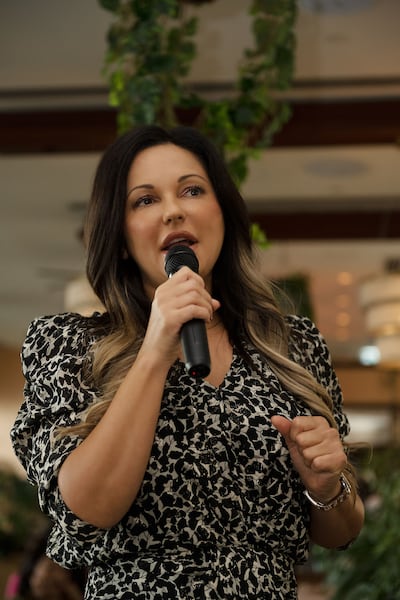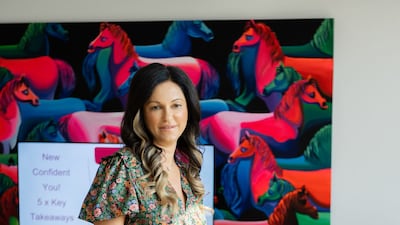Jealous colleagues, ruthless bosses and unrelenting workloads — does this sound familiar?
For some office workers it’s all part of an average day, according to a recent McKinsey Health Institute report.
The institute surveyed 4,064 employees in Kuwait, the UAE, Saudi Arabia and Qatar last year to understand the state of employee health in the region and published the results in January.
The study showed 66 per cent of respondents reported symptoms of poor mental health or had a firm diagnosis. One in three of those surveyed also reported symptoms of burnout and the report found that three-quarters of participants were happy at work.
The report highlighted the UAE as an "early adopter" in integrating well-being into its national agenda and said that further opportunities existed for similar and increased engagement between employers and employees across the region. McKinsey concluded that better health can start with greater awareness.
Here, four people tell The National about their own negative experiences in the workplace.
'Shattered my confidence'
Emma Burdett, 43, who had a breakdown after experiencing “horrific” workplace bullying when she worked in a sales role in Dubai.
“I’ve been bullied, fired, harassed and manipulated,” she said.
“In one job I was fired on the spot without reason. It completely shattered my confidence and made me question my self-worth. I spent weeks crying, upset, broken and depressed.
“The trauma of what had happened resulted in me having a breakdown. That was a really scary time for me and I started to question my existence.”
Ms Burdett believes her experiences were sparked by gender discrimination and jealousy caused by her professional success.

During her sales role, she reports being “excluded and belittled”.
After seeking help and rebuilding her confidence, Ms Burdett launched Women in Leadership Deliver (Wild), in 2018, a UAE-based corporate women’s network that aims to tackle workplace toxicity through transformational coaching, wellness and events.
Last year, the company set up in Riyadh.
“To be able to give Saudi women a platform to use their voices is so emotional for me,” she said.
“It’s my life’s work to make sure nobody goes through what I did.”
Lucrative role turned into nightmare
After being headhunted for a lucrative marketing role in Kuwait, Bader Shahin, 36, was left confused and distressed after his new boss began to “humiliate” and “undermine” him in front of his colleagues.
The former bodybuilder said he was subjected to taunting and public put-downs, leaving him questioning his work and his value as a person.
“Why would you seek someone out and then destroy them?” said Mr Shahin, who now lives in Dubai.

“I've seen how far a toxic workplace can take someone in their head and it's not a pretty place.
“It was a case of grinding me down to the point where I had no confidence whatsoever.”
At his lowest ebb, Mr Shahin said he collapsed in the office after a disagreement got out of hand.
“She started shouting at me across the office and my legs just started shaking uncontrollably,” he said.
“I couldn’t handle the pressure any more and I fell to my knees. My mental health had really begun to suffer.”
Since moving to Dubai five years ago, Mr Shahin has channelled his experiences into his current role as a marketing director at the Arabic mental health platform Ayadi.
“I don’t appreciate or encourage it, but I understand now why people behave like this,” he said. “Often they’ve been mistreated themselves and they take that anger out on other people.”
'Small minority can have a big impact'
Caroline Perch, 35, has worked at several public relations companies and said that industry can be rife with bullying.
“I left a position because I couldn’t cope with the anxiety any more,” she said. “I didn’t even have a new job to go to. I just knew that keeping a job wasn’t worth the cost to my mental health.”
Ms Perch claims she witnessed colleagues being “frogmarched” out of the office after on-the-spot sackings.
“Gossipy” office culture was another concern and professional disagreements tended to escalate into personal grudges, she said.
“Toxic isn’t the word to describe some of the offices I worked in,” she said. “Certain colleagues would go out of their way to make my life difficult every single day.
“There were times in meetings where people wouldn’t even look at me or acknowledge that I had spoken, purely because I had ideas that they didn’t agree with. It had a big effect on me, and it still does now.”
Currently, Ms Perch is being interviewed for new jobs in the UK and her experiences with toxic offices have led her to be cautious about joining a new company.
“It’s definitely had a lasting effect on me and the most important thing for me now is workplace culture,” she said. “Now I ask about staff turnover rates, staff retention rates, benefits for staff, mental health initiatives.”
For Ms Perch, her experiences during her four years in the UAE were due largely to a competitive culture among expats, but not all of her roles in the region have been so damaging.
“I’ve worked in some great agencies in the region and Dubai has so many opportunities for workers. It’s an incredible place for career progression and it’s a shame that a small minority can have such a big effect,” she said.
Speak up for yourself
Workplace culture consultant and UAE life coach Heather Broderick, 42, left a career as a teacher after experiencing toxicity first-hand.
Ms Broderick claims inefficient school leaders, zero growth opportunities and a lack of respect led to her leaving the classroom for good, and she encourages all of her clients to put their well-being before their job.
“Life here is expensive and people put up with toxic workplaces in order to give themselves or their family the life they need away from home,” she said.
“I learnt that not only is health more important, but the move and courage to take the risk and leave could be the one thing that changes everything in your life for the better.”
Now, Ms Broderick advises tackling workplace issues head-on, rather than allowing problems to escalate.
“My advice for dealing with it is always to communicate,” she said. “We can tell so much about a person when they are confronted.
“Keep it about yourself and how you feel so as not to blame or slander but be clear about the things that are unacceptable.
"If things do not change, I always recommend drawing that boundary and leaving.”




